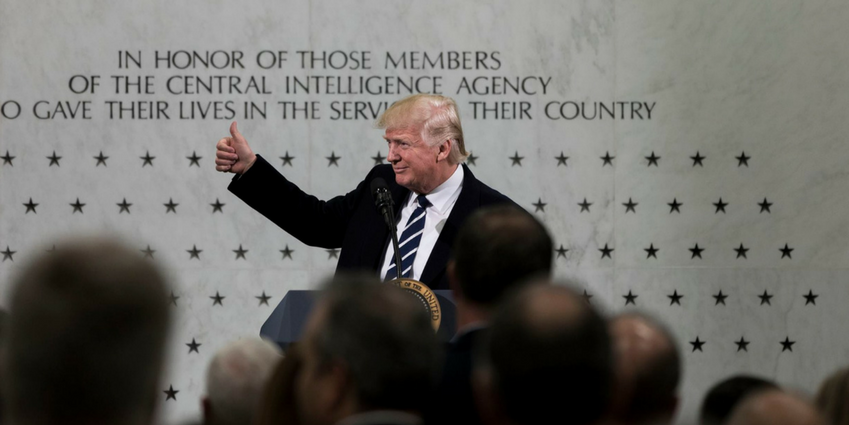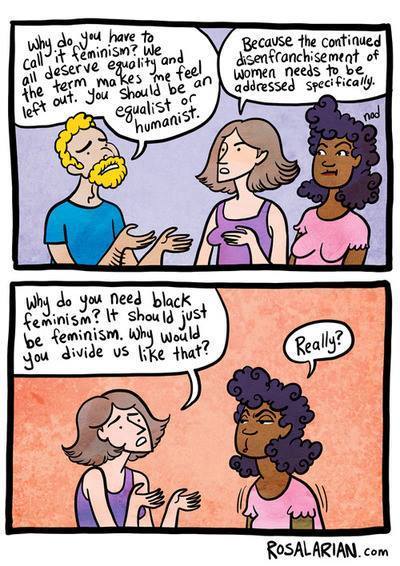
by Miranda Deebrah – Follow @browngirlmag
Since the Presidential Inauguration, watching the government’s actions has been especially rough for people of color (POC). Not that every day isn’t already rough for us but with the recent Executive Orders passed which threaten the rights of so many marginalized groups, getting through one day at a time is even more frustrating, exhausting and draining for so many of us.
And those of us with white friends who are blinded by their privilege and just don’t seem to grasp how dire the situation is are increasingly finding ourselves placed in difficult positions where we must choose between salvaging friendships now wrought with tension or standing our ground and calling our friends out on their microaggressive behavior and demanding better from them. Oftentimes, they mean well but end up repeatedly putting their foot in their mouths and normally we’d let it slide. But these aren’t normal times and we cannot afford to let anything slide that dehumanizes us and contributes to the systems in place that deny us our rights.
So frequently have I been subjected to microaggressive language over the last several weeks, that I have compiled a list of things which have actually been said to me multiple times by well-meaning white people including friends, but which have just proven to be harmful rhetoric which further perpetuates the racism that runs rampant far more visibly now than what it seemed before. I am certain that almost every POC has had these and similar things said to them. Frankly, we are tired of it and it needs to stop and I’m going to particularly address our white friends and explain exactly why they shouldn’t say the following to us.
1. “I don’t see color. We are all the same.”
This is a classic. Colorblind ideology: seemingly good in theory, but awful in practice and counterproductive to progress.
First of all, you had better see our color because we’re damn proud of it. See it, appreciate it. Our complexion is a big part of who we are, our identities and histories. We are all human, yes, and it’s beautiful. But we are undeniably different and are treated as such. Which is why we’re in this mess in the first place. Acknowledge this.
We must celebrate both our differences and our common humanity together. Honestly, a homogeneous society kind of sucks and doesn’t often allow for much challenge and growth if everything is pretty much the same. But power and strength lie in diversity and inclusion where we can learn and grow from each other. So see our color and love us as we are because it is a part of us, not in spite of it.
2. “I have nothing to do with that [insert form of racism].”
News flash: You have everything to do with it. Anyone born with the privileges that come with being white perpetuates and benefits from racism. There is no getting around it. But what you can do with this privilege is use it to your advantage to speak up to amplify and support the voices of marginalized groups. You may not feel responsible for those who are outright racist, but it is still 100% your problem. It matters that you speak up and use your voice in the struggle. You can help end racism. POC cannot do it alone.
[Read Related: Non-Black People of Color Owe Immeasurable Debts of Gratitude to Black Americans]
3. “Don’t be upset/angry.”
Do not dismiss our anger just because you don’t like it or can’t handle it. It’s completely valid and we will express it how and when we please. White people do not get to decide how POC react to and fight our oppression. We have been fighting a long time and have every right to be angry because we’re still fighting while some are just now waking up to this reality. Give us space and time to be angry, accept it as part of our journeys, and understand that the anger comes from a place of great pain. Deal with it the same way we deal with ignorance daily.
4. “Your aggressive tone makes me not want to try or be your ally.”
Your allyship should not ever be conditional on whether we are polite in tone or not. If it is, you are being selfish and will prove to be useless in the resistance. POC need allies who will stand with us through it all, both the good and the bad. Our humanity should be enough for you to be our ally and should never be based upon how our tone comes across when we speak and express ourselves. POC should never have to convince you we are worth fighting for. We are worth it. And if we have to prove it, you are no ally to us at all and never were.
5. “Why are you being mean? Speak to me nicely.”
To put it simply, don’t be a baby. Racism is harsher and more brutal than any “mean” words we use to call you out. We aren’t being mean, we are telling the truth and it won’t be pretty. Again, any anger or frustration we express is fully warranted. The truth hurts, but racism hurts far, far worse.
6. “How dare you accuse me of being a racist, one of the worst things ever???”
See the above explanation. If you think being called a racist is worse than the actual racist and horrific crimes committed against POC, as history and current events have shown and continue to show us, then your ignorance and self-centeredness are off the charts. Open your eyes. RACISM KILLS.
7. “I don’t need to educate myself.”
Oh yes, you do. And POC will not do it for you. Pay us for our work and emotional labor if you want our help to guide and raise you out of your ignorance. The work we do is not easy. Every time we call you out and willingly try to educate you a little, we’re doing you a favor. But it is not our job to teach you. Do your own research. The internet is free, full of resources and at your disposal.
8. “Not all white people/white women …”
Yes, all white people. All white people benefit from racism. The same way “yes all men” applies when we fight sexism because they benefit from it. Here’s a graphic to explain this concept succinctly.

[Photo Source: Rosalarian.com]
Furthermore, white feminism is a problem. Feminism, or any movement for that matter, must be intersectional. Racism, classism, sexuality, disability, etc., it must be inclusive of all this and more. False solidarity will get us nowhere. We cannot talk of “sisterhood” in feminism, for instance, if we cannot first acknowledge that women of color, in particular, have additional struggles white women have never and will never face.
9. “Stop making generalizations about white people.”
The generalizations made about white people when POC collectively group them together are not harmful because white people hold all the power in society which protects them, whereas POC hold no power and the generalizations made about us are dangerous and can, in fact, harm us by reinforcing negative stereotypes about us. There is a significant difference here and false equivalences must not be thrown around. We must be conscious of this.
10. “47 percent of us (white women) voted Hillary …”
Women of color did our part during the election. We showed up. The majority of white women didn’t. You may be part of the 47%, good for you, but you’re still part of the whole demographic of white women in general, so you can’t distance yourself from it just because it makes you uncomfortable. It’s about accountability. Own it. Unfortunately, the 53% are your shame. You are responsible for holding your own accountable and getting them to educate themselves. Grouping you along with the white women who voted for this administration won’t hurt anything other than your ego. As citizens and fellow human beings, we are responsible for our communities and those like us. We are our sister’s keeper.
11. “You’re being divisive.”
No, actually we’re not. White people divided us by race and created the social construct of race in the first place. This is history. We are just holding up a mirror to you to see the racism internalized and conditioned within you so you can better yourself. We all have to work hard to unlearn racism and beat it out of ourselves. As previously stated, when we call you out, it’s a favor to you.
12. “You see racism everywhere.”
Racism is everywhere. It is in every aspect of life and affects POC daily. Just because you don’t see it, it doesn’t mean it isn’t there. It isn’t just the overt, in-your-face racism we’re talking about. It’s the subtle, covert microaggressions around us every day that are just as harmful too. Pay closer attention, you’ll start seeing it.
13. “I’m not racist, I have black/brown friends!”
Except that’s not how racism works. Please see above. You can have friends of color and still say and do racist things without meaning to. Besides, you being friends with POC is not doing us a favor, nor does it prevent racist behavior on your part by default. It’s practically the bare minimum. Don’t expect credit for it.
14. “You’re not listening to me. You’re hurting my feelings.”
This is not about feelings, this is about fighting injustice and oppression and correcting it. You must decenter your feelings and consider the very real dangers POC are facing. You contribute to the silencing of POC’s voices when you make this about how you feel. And believe it or not, your friends of color have always listened to you and prioritized your feelings first to make sure you are comfortable but we cannot afford to put your comfort first anymore. Lives are at stake. Understand that. It is time for you to listen to us when we speak of our experiences which you will never truly understand.
15. “Reverse racism …”
Ok, don’t even go there. It does not exist. It does not go both ways. None of that. POC in majority-white societies cannot be racist to white people. Racism is prejudice + power. Nevermind what the dictionary says, it’s inaccurate anyway and is written by white men the same way history was so it’s not very reliable in comparison to what goes on in real life. POC might be prejudiced, sure (which I might add is usually in reaction to how poorly we are treated by white people), but we hold no societal/structural/systemic power to discriminate. So to reiterate: Reverse racism doesn’t exist. It’s not up for debate. Discussion closed. The end.
Having been on the receiving end of these and more, I can tell you it honestly is damaging and hurtful especially coming from friends. I could probably handle seeing the KKK on my front lawn because at least I know where they stand in their beliefs and I’ll know what I’m up against, but what I cannot take after so many times is someone who claims to be a good friend, yet refuses to show empathy, compassion and understanding for those who are adversely affected by things that don’t affect them as much, if at all.
I expect better from those I call my friends, I demand better, I insist on it. The time to choose which side of history we’re on is NOW. Each of us must make this choice. Neutrality or apathy is not an option. And I want, no I need, to know that my friends stand with me the same way I stand with them. It starts with being humble, acknowledging our faults and owning when we slip up and hurt our most vulnerable friends, and realizing there is much work to be done both within ourselves and out in the world.
Everyone must play their role in the resistance against fascism which is rising again so quickly. And we must get to work now. Or we all lose.
 Miranda Deebrah is an Indo-Guyanese writer and storyteller based in New York. Proud of her roots and heritage, she is an advocate for South Asian voices not yet heard and the stories not yet told. She is passionate about the arts and their ability to create change in the world and hopes to make her own contributions through her work. Her interests include traveling, reading biographies, spending evenings at the theater, reenacting choreography from Lady Gaga’s music videos, taking flying trapeze lessons, and making all kinds of magic happen.
Miranda Deebrah is an Indo-Guyanese writer and storyteller based in New York. Proud of her roots and heritage, she is an advocate for South Asian voices not yet heard and the stories not yet told. She is passionate about the arts and their ability to create change in the world and hopes to make her own contributions through her work. Her interests include traveling, reading biographies, spending evenings at the theater, reenacting choreography from Lady Gaga’s music videos, taking flying trapeze lessons, and making all kinds of magic happen.




